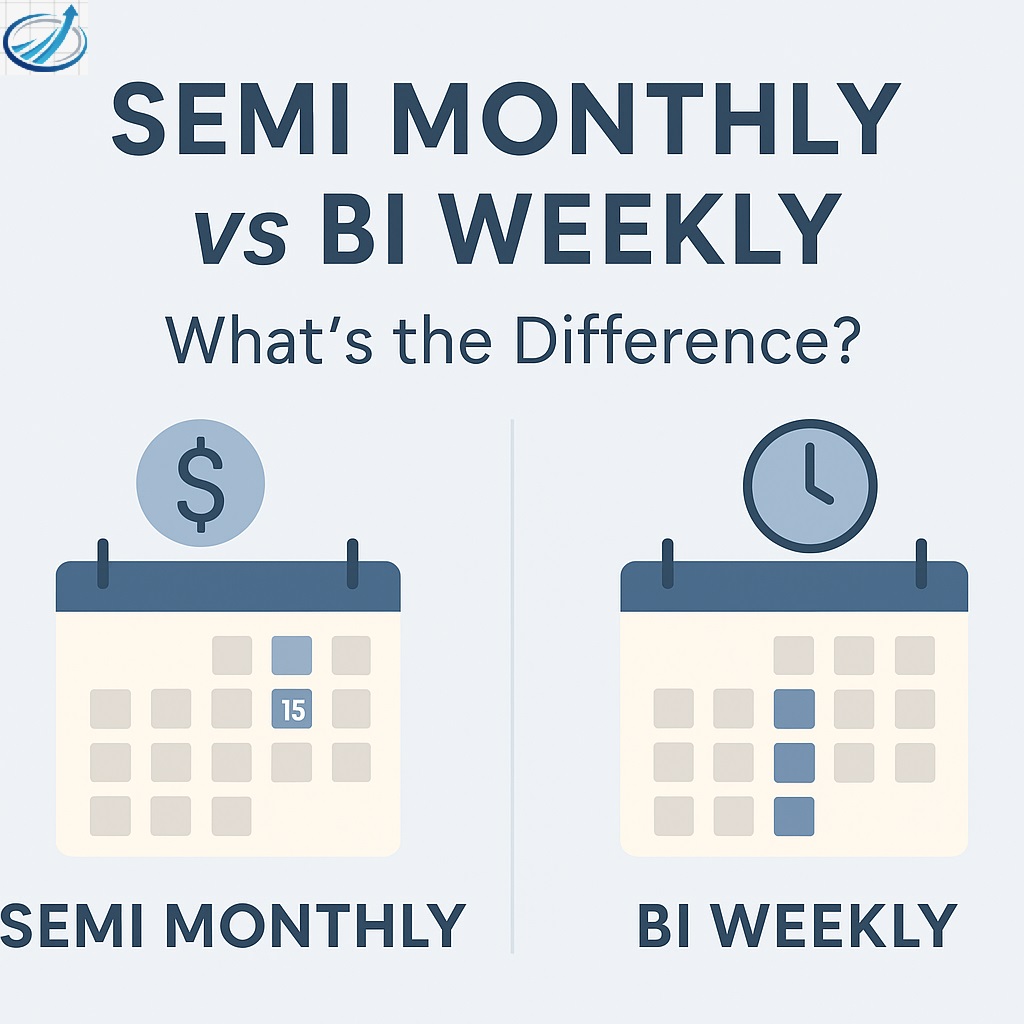When it comes to getting paid, understanding your payroll schedule is crucial—especially if you’re budgeting, paying bills, or managing finances closely. One of the most common areas of confusion lies in the terms semi monthly vs bi weekly. While they may sound similar, they’re quite different in practice and can impact how you plan your financial life.
In this guide, we’ll break down both pay schedules, compare them side-by-side, and help you figure out which one might be more beneficial depending on your lifestyle and career.
🔍 What Does “Semi Monthly” Mean?
A semi monthly pay schedule means you’re paid twice a month, usually on set dates like the 15th and the last day of the month. This results in 24 paychecks per year. 📆
For example:
- ✅ January 15
- ✅ January 31
- ✅ February 15
- ✅ February 28 (or 29 in leap years)
These dates remain consistent, regardless of which day of the week they fall on.
🔁 What Does “Bi Weekly” Mean?
A bi weekly pay schedule means you’re paid every two weeks, usually on the same weekday (like every other Friday). This results in 26 paychecks per year, and occasionally 27, depending on how the calendar falls. 📅
Example:
- 🔄 January 5 (Friday)
- 🔄 January 19 (Friday)
- 🔄 February 2 (Friday)
Unlike semi monthly, bi weekly paydates may vary from month to month, and sometimes you get paid three times in a single month. 💵
⚖️ Semi Monthly vs Bi Weekly: What’s the Difference?
Let’s look at how these two schedules compare across key areas:
| 🧾 Feature | 💼 Semi Monthly | 🕒 Bi Weekly |
|---|---|---|
| 📊 Pay Frequency | Twice a month (24 times/year) | Every two weeks (26 or 27/year) |
| 📅 Common Pay Dates | 15th & last day | Every other Friday (or set weekday) |
| 💸 Budgeting Style | More fixed | Slightly more dynamic |
| 🧮 Payroll Complexity | Easier for salary employees | Easier for hourly workers |
| 🔄 Monthly Pay Variation | Consistent | Sometimes includes 3 paychecks/month |
💡 Budgeting and Cash Flow: Which One’s Better?
From a budgeting standpoint, semi monthly vs bi weekly makes a big difference depending on your preferences:
- 🗓️ Semi Monthly: Great for predictable scheduling that lines up with rent, mortgage, or loan payments.
- ⏳ Bi Weekly: Offers more frequent paychecks and can lead to a feeling of receiving extra income during months with a third paycheck. 🎉
🏢 Employer Perspective: Which One Do Companies Prefer?
Many employers choose semi monthly for salaried positions because it aligns neatly with accounting periods and reporting schedules.
However, bi weekly is favored for hourly employees, as it simplifies:
- 🕑 Time tracking
- 🔢 Overtime calculations
- 💰 Payroll runs
Industry standards, union rules, or software systems can influence the choice too.
💵 Real-Life Example
Let’s say you earn $52,000 annually:
- Semi Monthly: You’d receive $2,166.67 per paycheck (52,000 ÷ 24).
- Bi Weekly: You’d get $2,000 per paycheck (52,000 ÷ 26).
At first glance, the bi weekly paycheck seems smaller—but remember, you get two extra paychecks per year! 🤑
🤔 Which Should You Choose?
If you’re self-employed or have a say in your payroll terms, here’s a quick guide:
✅ Choose Semi Monthly if:
- You prefer fixed pay dates 📆
- Your bills are due on specific days 🏠
✅ Choose Bi Weekly if:
- You enjoy more frequent cash flow 💸
- You like the surprise of an occasional third paycheck 🎁
There’s no absolute winner in the semi monthly vs bi weekly debate—it’s all about what fits your needs best.
❓ Frequently Asked Questions (FAQs)
🔹 Q1: Which pay schedule gives you more money?
👉 Technically, both cover your agreed annual salary. However, bi weekly gives you two extra paychecks in most years, which can feel like a bonus.
🔹 Q2: Is bi weekly harder to budget than semi monthly?
👉 It can be, because the dates change month to month. Semi monthly is more predictable—especially for fixed expenses like rent.
🔹 Q3: Do taxes differ between semi monthly vs bi weekly?
👉 No, the total tax burden is the same. The only difference is the amount per paycheck due to varying frequency.
🔹 Q4: Can I ask my employer to switch pay schedules?
👉 It depends on your employer’s policy. In most cases, employees don’t have control over the pay schedule unless they’re freelancers or contractors.
🔹 Q5: Is semi monthly or bi weekly better for hourly employees?
👉 Bi weekly is generally better, as it aligns more naturally with hourly tracking and overtime pay calculations.
🧠 Final Thoughts
Understanding the difference between semi monthly vs bi weekly can help you budget smarter, manage your cash flow, and avoid surprises in your paycheck. Whether you’re employed full-time, freelancing, or managing payroll, knowing how these systems work is essential for financial success.
Remember: it’s not just how often you get paid—it’s how well you manage what you receive. 💪💰



